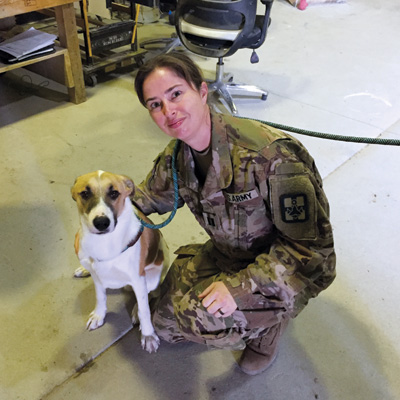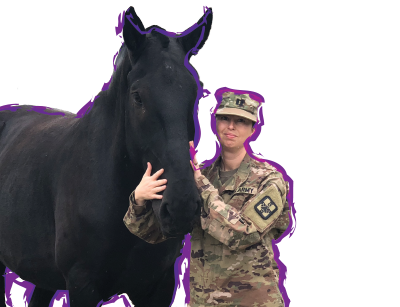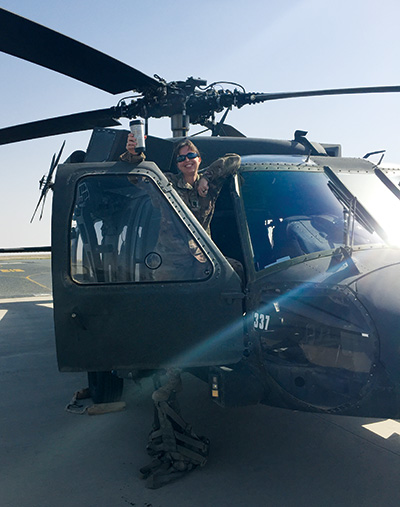

At the Michigan State University College of Veterinary Medicine, faculty service is typically clinical or diagnostic. For Dr. Stephanie French, academic specialist in anatomic pathology at the Veterinary Diagnostic Laboratory and in the Department of Pathobiology and Diagnostic Investigation, diagnostic service is only part of the story. She is also a major in the United States Army Reserve, where she serves as a veterinarian with a direct commission. Balancing these two roles, pathologist and soldier, both of which may seem off-the-beaten-path in veterinary medicine, is not as hard as some may think.

“The University is very accommodating; my colleagues are very accommodating. The Army tries to get me a schedule as quickly as they can so I can work with MSU to make sure they have coverage and that my being gone doesn’t impact them,” explains French.
Of course, the further you get into your career, the more responsibility you begin to take on. French has briefly held command of a small veterinary detachment, which required more commitment than one weekend a month and two weeks out of the year.
At the same time, her work at MSU also expanded. “Trying to balance all those things can be very challenging and sometimes I just have to say ‘No, I can’t do this.’ Every once in a while, the Army will drop something at the last minute and MSU has done a great job of scrambling to make sure we’re all good. It can be tough, but we make it all work.”
One of the reasons French joined the Army was the opportunity to go to places she wouldn’t normally get to go and to meet and work with people from different backgrounds. Her Army experience over the past 10 years has presented her with both unique responsibilities and destinations. The type of unit she was previously in cyclically deploys, and she was deployed to the Middle East for nine months in support of Operation Spartan Shield. She was stationed in Kuwait but had missions in the United Arab Emirates and in Jordan.
She also completed a two-week Food and Water Risk Assessment mission in Belize. This type of mission makes sure the food and water supply and facilities will be safe whenever military personnel stay at a facility in a foreign nation.
“My role is to evaluate the facility based on established criteria and send a report to the Army for them to decide whether they want to use that facility, or what level of risk they are going to accept,” says French.
“I also went to Guam and South Korea for a week each as an invited speaker at veterinary symposiums as it pertains to the military.”
To explain her role at the Laboratory, French says, “I’m like an animal coroner. The way I explain it to kids is that I’m like a detective. Someone comes to me with a mystery involving their pet, and I look at all the different clues in the tissues, in the history of the animal, in the information I get from a veterinarian about how the animal was in the clinic, and I put all of those pieces together to try to figure out what’s going on with the animal, or if it’s deceased, what caused it to be deceased or what contributed to that.”
French finds rewards in both of her service roles. “On the diagnostic side, it’s especially rewarding to give people closure. Even if I can’t give them an exact answer, I can usually give them some information about what it wasn’t. As a pet owner, I would want that information too. If it’s a livestock issue, I like being able to help farmers protect the rest of their herd,” says French.
“On the military side, working with military dogs, seeing that partnership between the military dog and their handler, and knowing I’m part of the team to keep them both safe is important. And on the food side of the Army mission, I have a critical role in making sure soldiers have safe food and water. We think of keeping soldiers safe with advanced weapons technology, but when it gets right down to it, the food supply is essential.”

There’s no arguing the stakes are high both at the Laboratory and in the Army. “I make decisions that could mean life or death for an animal when reading out a biopsy. I make decisions that mean a dog may go out on another mission or may be retired. I make decisions that the Army is going to take into consideration when deciding to renew a facility’s contract.”
Having taken a somewhat non-traditional career path, French offers some advice and encouragement to veterinary students and fellow veterinary professionals.
“When I was setting out to become a veterinarian, it felt like there were very few options . . . and it wasn’t until I got into vet school and beyond that I realized veterinarians serve in so many different capacities.
“It’s okay if you don’t know what you want to do. You can constantly rediscover yourself and discover your passion. By getting out there and trying new things, you get to learn what you like and what you don’t like. My goal is to try to experience as many things as possible in my life.” 
